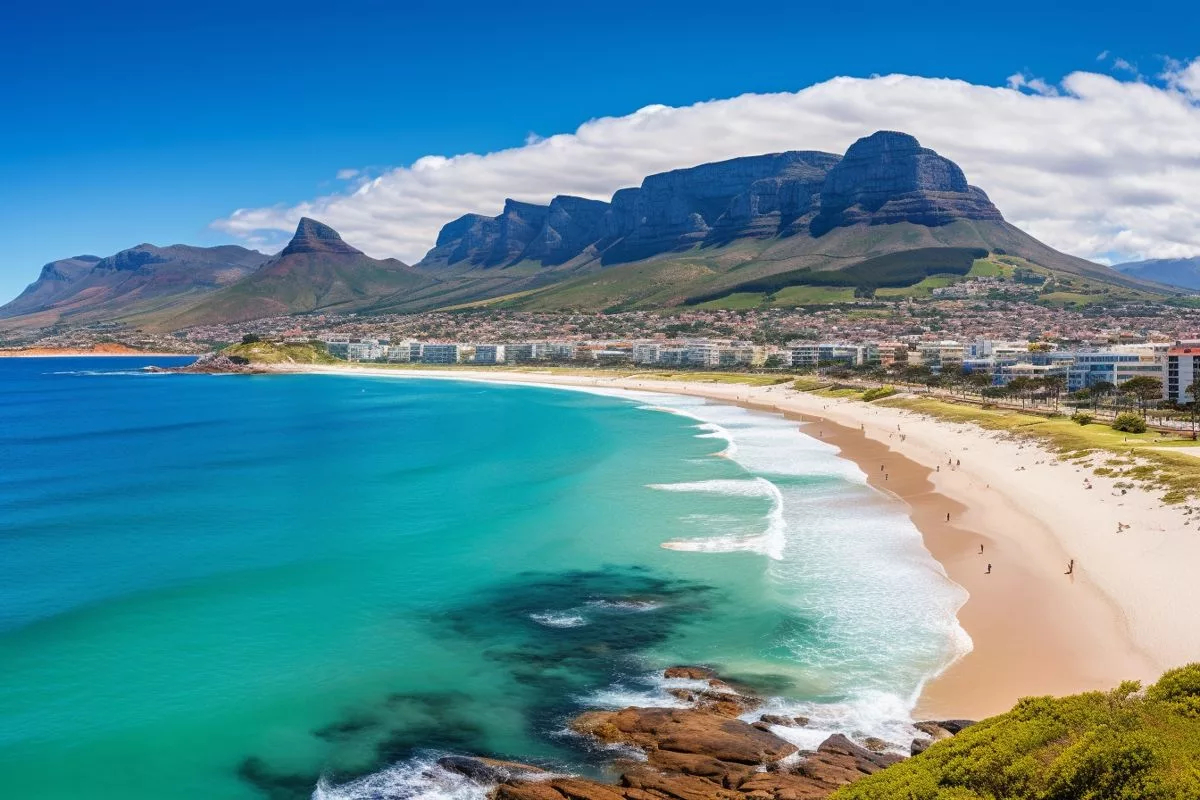Cape Town’s commitment to environmental preservation is evident in its Blue Flag beaches, which meet strict criteria for water quality, safety, and amenities. The city boasts seven Blue Flag beaches and three Blue Flag marinas, offering visitors not just beautiful vistas but also environmental education programs. Cape Town’s dedication to sustainable environmental management practices has earned it the prestigious Blue Flag Long Service Award, reinforcing its status as a global beach vacation hotspot.
Cape Town: A Beacon of Pristine Blue Flag Beaches
Cape Town’s dedication to ecological preservation and environmental stewardship is embodied in its impressive array of Blue Flag beaches. Managed by the Wildlife and Environment Society of South Africa, the Blue Flag distinction is bestowed upon beaches that meet stringent criteria for water quality, environmental education, safety, and amenities. Cape Town boasts seven Blue Flag beaches and three Blue Flag marinas, exemplifying its commitment to sustainable environmental management practices. These beaches attract both locals and tourists with their beauty, environmental education programs, cleanliness, and well-kept facilities.
Cape Town is renowned globally for its breathtaking vistas and enthralling tourist destinations. However, its commitment to ecological preservation and environmental stewardship is equally praiseworthy. A prime example of this pledge is the city’s impressive array of Blue Flag beaches. Cape Town boasts one of the highest tallies of Blue Flag certified beaches nationwide, signifying its unyielding dedication to upholding international standards.
Blue Flag: A Badge of Honour
The Blue Flag distinction, managed by the Wildlife and Environment Society of South Africa (WESSA), is a significant accolade for any city. This environmental hallmark, bestowed upon more than 4,000 beaches and marinas globally, implies superior water quality, environmental education, safety measures, and amenities. Cape Town’s seven beaches have not only achieved this honor, but they have also been active participants in the Blue Flag Beach Programme since its inception in South Africa in 2001.
Consistency in preserving high benchmarks has resulted in Cape Town receiving the prestigious Blue Flag Long Service Award. This accolade is a demonstration of the city’s enduring commitment to fulfilling the stringent criteria of the Blue Flag Programme. It exemplifies the effective sustainable environmental management practices that have conserved the coastal ecosystem of these beaches.
Beyond the Surface
The allure of Cape Town’s Blue Flag beaches extends beyond the picturesque landscapes. Each beach offers unique environmental education programs, instilling in visitors the value of conservation while basking in the warmth of the sun and frolicking in the surf. Cleanliness, safety standards, superior bathing water, and well-kept facilities such as restrooms and parking lots further elevate the status of these beaches.
During the 2015/16 summer season, full Blue Flag status was conferred to seven Cape Town beaches, namely Bikini Beach, Mnandi Beach, Strandfontein Beach, Llandudno Beach, Camps Bay Beach, Clifton 4th Beach, and Silwerstroomstrand. These beaches captivate both locals and tourists with their beauty and appeal.
Recognitions Beyond the Shores
Moreover, three Cape Town Marinas – the False Bay Yacht Club, the Water Club, and Harbour Island – also received full Blue Flag recognition. This achievement reaffirms Cape Town’s pledge to sustainable practices, not just on land, but also across its aquatic territories.
The 2015/2016 summer season also witnessed Fish Hoek, Seaforth, Muizenberg, and Melkbosstrand beaches earn the Pilot Blue Flag status. This acknowledgment implies that upon meeting specific criteria within a given timeframe, these beaches could potentially achieve full Blue Flag status.
A Global Beach Hotspot
The impressive tally of Blue Flag beaches in Cape Town not only instills a sense of pride in the city but also amplifies its stature as a leading global beach vacation hotspot. The city’s ambition to increase its count of Blue Flag beaches further underscores its commitment to environmental conservation and top-tier tourist encounters.
In a time where sustainability issues are of utmost importance, Cape Town’s Blue Flag beaches serve as potent symbols of the power of prioritizing environmental management. They stand as luminous markers of the city’s devotion to ecological preservation, inviting beach enthusiasts worldwide to enjoy Cape Town’s pristine sands and waters.
As Cape Town consistently upholds the Blue Flag standard, it proffers a captivating mix of relaxation and education, enjoyment and conservation, to all who explore its remarkable coastline. It’s not merely about sunbathing or swimming in the crystal-clear waters; it’s also about understanding and appreciating the delicacy and grandeur of nature and recognizing the need to safeguard it for future generations.
What is a Blue Flag beach?
A Blue Flag beach is a beach that meets strict criteria for water quality, safety, environmental education programs, and amenities. This environmental hallmark is managed by the Wildlife and Environment Society of South Africa (WESSA) and is bestowed upon more than 4,000 beaches and marinas globally.
How many Blue Flag beaches does Cape Town have?
Cape Town boasts seven Blue Flag beaches and three Blue Flag marinas. The beaches that have achieved this honor are Bikini Beach, Mnandi Beach, Strandfontein Beach, Llandudno Beach, Camps Bay Beach, Clifton 4th Beach, and Silwerstroomstrand.
What is the Blue Flag Long Service Award?
The Blue Flag Long Service Award is an honor bestowed upon cities that have consistently upheld the stringent criteria of the Blue Flag Programme. Cape Town has received this prestigious award, demonstrating its enduring commitment to sustainable environmental management practices and the conservation of its coastal ecosystem.
What are the benefits of visiting a Blue Flag beach in Cape Town?
Visiting a Blue Flag beach in Cape Town offers more than just picturesque landscapes and crystal-clear waters. Each beach offers unique environmental education programs, instilling in visitors the value of conservation while enjoying the warmth of the sun and frolicking in the surf. Cleanliness, safety standards, superior bathing water, and well-kept facilities such as restrooms and parking lots further elevate the status of these beaches.
Which marinas in Cape Town have received the Blue Flag recognition?
Three Cape Town marinas – the False Bay Yacht Club, the Water Club, and Harbour Island – have received full Blue Flag recognition. This achievement reaffirms Cape Town’s pledge to sustainable practices, not just on land, but also across its aquatic territories.
What does Cape Town’s Blue Flag beaches say about their environmental commitment?
The impressive tally of Blue Flag beaches in Cape Town amplifies its stature as a leading global beach vacation hotspot, demonstrating its unyielding dedication to upholding international standards of environmental preservation and ecological stewardship. The city’s ambition to increase its count of Blue Flag beaches further underscores its commitment to environmental conservation and top-tier tourist encounters.








